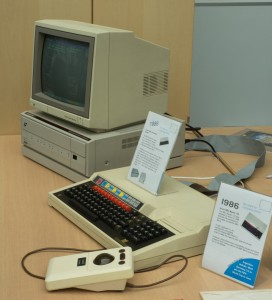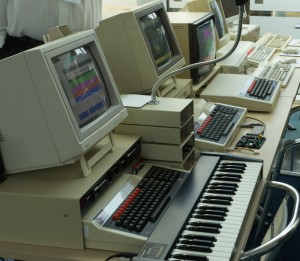 There was a great opportunity in Cambridge today for techies of a certain age to get all nostalgic about a machine which, for many of us, changed our lives, at the 30th anniversary party for the BBC Micro.
There was a great opportunity in Cambridge today for techies of a certain age to get all nostalgic about a machine which, for many of us, changed our lives, at the 30th anniversary party for the BBC Micro.
Organised by Jason Fitzpatrick’s soon-to-be-Cambridge-based Centre for Computing History, with the assistance of ARM, Redgate and several others, this brought together most of the original team, and many of the original machines and peripherals, that we remembered so well.
There was much discussion about the legacy of the project, and my friend Eben Upton gave an inspiring talk about the aims of the Raspberry Pi team, which many hope will be the BBC Micro for the next generation.
One thing that occurred to me during the presentations was that the original BBC Model B sold for £399, or approximately £1200 in today’s money. (That’s about the price of a MacBook Pro now.) The investment that my parents were making in my future was not the cost of a Raspberry Pi. It was the cost of about 40 Raspberry Pis – a whole classroom-full. Eben, significantly, pointed out in his talk that they hoped it wouldn’t really be schools or parents who would buy most of these. It would be the children themselves. And I think that’s important.
 Now, progress always depends on building new layers of technology on the platforms provided by the past. When I was young, the transition in play was from a world in which we bought electronic components to one in which we bought computers. Sinclair and Acorn made that transition accessible to kids. But computers are now a commodity, and you can argue that what’s really important for kids to learn is the different ways of connecting them together in the real world. So my hope is that initiatives like Raspberry Pi will allow kids not just to own a computer, but to own a network. To learn about how networks work, to invent new ways of making use of them. Yesterday’s solder track is today’s ethernet cable. Yesterday’s 6502 assembly language is today’s IPv6 routing table.
Now, progress always depends on building new layers of technology on the platforms provided by the past. When I was young, the transition in play was from a world in which we bought electronic components to one in which we bought computers. Sinclair and Acorn made that transition accessible to kids. But computers are now a commodity, and you can argue that what’s really important for kids to learn is the different ways of connecting them together in the real world. So my hope is that initiatives like Raspberry Pi will allow kids not just to own a computer, but to own a network. To learn about how networks work, to invent new ways of making use of them. Yesterday’s solder track is today’s ethernet cable. Yesterday’s 6502 assembly language is today’s IPv6 routing table.
And if we believe that there’s any mileage in the internet-of-things/automated-home ideas, then perhaps the equivalent investment that today’s parents might make could be, say, a ‘connected room’ kit, which allowed kids to give a URL to each lightbulb, each plug socket, each radiator valve, each loudspeaker, and the door. And then see how they link those together, and to their Facebook account, and to the Xbox, and so forth. Turn the music on when you turn on the light. Turn the heat down when you go to bed. Turn the lights down when you turn on the TV. It’s a Lego kit that lets you play with the living spaces of the future, and perhaps monitor your carbon footprint at the same time.
Maybe… I don’t know. There may be better ideas. This sounds fun to me, though! It could teach you a lot about networking.
And it could still cost much less than the original BBC Micro did.